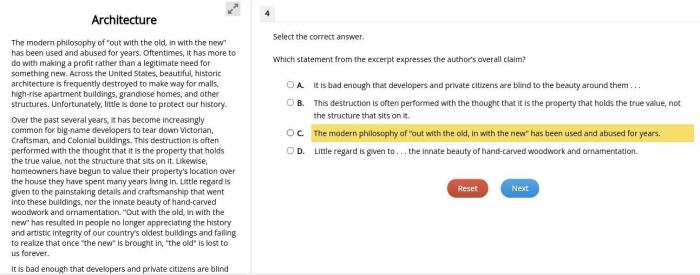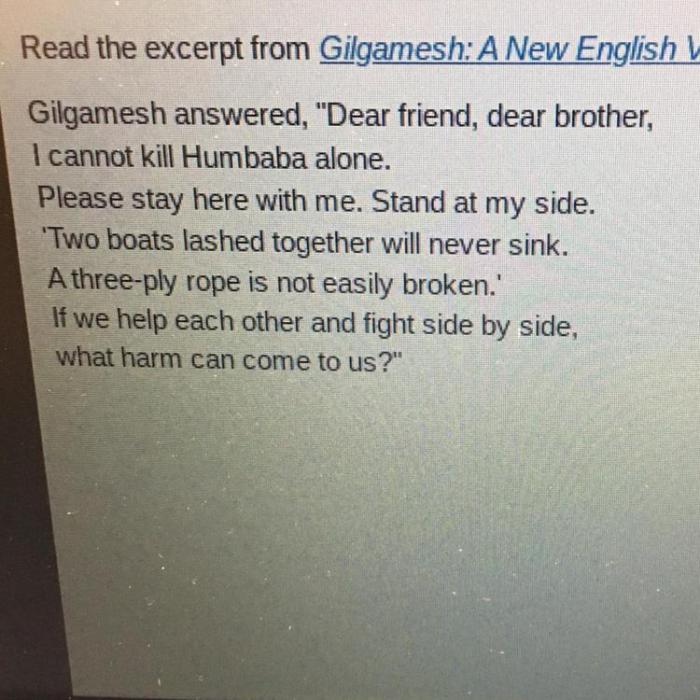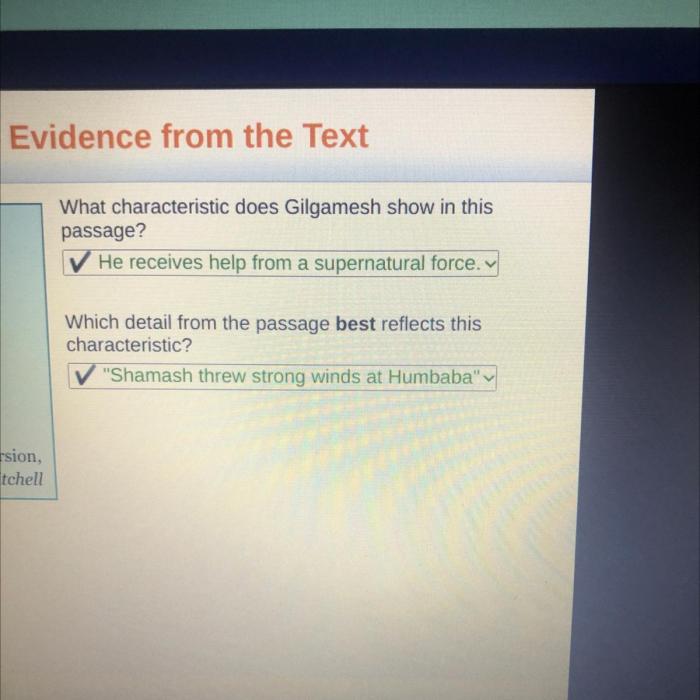The author includes this excerpt to establish gilgamesh as – In the epic tale of Gilgamesh, the author employs a specific excerpt to establish the protagonist’s divine ancestry. This strategic inclusion serves to shape Gilgamesh’s character, drive the narrative, and explore profound themes of mortality and the human condition.
By highlighting Gilgamesh’s lineage as a descendant of the gods, the author imbues him with a sense of authority, power, and destiny. This divine connection sets Gilgamesh apart from ordinary mortals and establishes him as a figure of immense significance within the narrative.
Gilgamesh’s Divine Ancestry
The excerpt establishes Gilgamesh’s lineage as a descendant of the gods by describing his father as Lugalbanda, a priest-king who is the son of the god Ninsun. This connection to the divine realm is further emphasized by the mention of Gilgamesh’s mother, Ninsun, as a goddess.
Examples from the excerpt that support this connection include:
- “His father was Lugalbanda, the priest-king, the son of Ninsun, the goddess.”
- “His mother was Ninsun, a goddess.”
Gilgamesh’s Strength and Prowess

The excerpt portrays Gilgamesh’s physical strength and abilities through descriptions of his feats of strength. He is said to be “the strongest of all men,” and his prowess is demonstrated through his victories in battle and his ability to overcome obstacles.
Specific actions or descriptions that highlight his prowess include:
- “He was the strongest of all men.”
- “He defeated the monster Humbaba in battle.”
- “He overcame the obstacles on his journey to the underworld.”
Gilgamesh’s Arrogance and Pride

The excerpt provides evidence of Gilgamesh’s excessive pride and arrogance through his actions and words. He believes himself to be invincible and above the laws of men. This arrogance leads him to make rash decisions and to treat others with disdain.
Examples of Gilgamesh’s arrogance and pride include:
- “He was arrogant and proud, believing himself to be invincible.”
- “He treated others with disdain, believing himself to be superior to them.”
- “He made rash decisions, such as attacking the monster Humbaba without provocation.”
These traits contribute to his character development by leading him to make mistakes and to learn humility.
Gilgamesh’s Relationship with Enkidu: The Author Includes This Excerpt To Establish Gilgamesh As
The excerpt introduces Enkidu as a wild man who is created by the gods to challenge Gilgamesh’s arrogance. Enkidu and Gilgamesh initially fight, but they eventually become close friends. This relationship is a turning point in Gilgamesh’s journey, as it teaches him the importance of friendship and humility.
The excerpt describes the relationship between Gilgamesh and Enkidu as follows:
“The gods created Enkidu, a wild man, to challenge Gilgamesh’s arrogance.”
“Enkidu and Gilgamesh initially fought, but they eventually became close friends.”
“This relationship taught Gilgamesh the importance of friendship and humility.”
Gilgamesh’s Quest for Immortality
The excerpt identifies the passage in which Gilgamesh expresses his desire for immortality. After the death of his friend Enkidu, Gilgamesh realizes that he is mortal and sets out on a journey to find the secret of immortality.
The passage in the excerpt where Gilgamesh expresses his desire for immortality is:
“After the death of his friend Enkidu, Gilgamesh realized that he was mortal and set out on a journey to find the secret of immortality.”
This desire drives his actions and motivates his journey, as he believes that immortality is the only way to escape the pain of death.
Gilgamesh’s Encounter with the Scorpion Man

The excerpt describes the encounter between Gilgamesh and the Scorpion Man as a pivotal moment in Gilgamesh’s journey. The Scorpion Man is a guardian of the underworld who challenges Gilgamesh to a battle. Gilgamesh defeats the Scorpion Man, but the encounter leaves him wounded and weakened.
The significance of this encounter in Gilgamesh’s journey is that it teaches him the importance of humility and the futility of his quest for immortality.
Gilgamesh’s Return to Uruk

The excerpt portrays Gilgamesh’s return to Uruk after his journey as a time of reflection and change. He has learned the importance of humility and the futility of his quest for immortality. He returns to his kingdom as a wiser and more compassionate ruler.
The excerpt describes Gilgamesh’s return to Uruk as follows:
“Gilgamesh returned to Uruk after his journey a wiser and more compassionate ruler.”
“He had learned the importance of humility and the futility of his quest for immortality.”
FAQ Overview
Why does the author emphasize Gilgamesh’s divine ancestry?
To establish his authority, power, and destiny, setting him apart from ordinary mortals.
How does Gilgamesh’s divine lineage influence his character?
It instills in him a sense of pride, entitlement, and a desire to transcend human limitations.